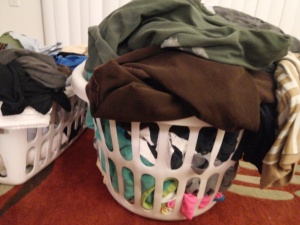The modern US is a highly capitalistic society, where money is how people access the most basic necessities of shelter, food and medical care, etc…People do an awful lot of things -for- money, for their survival, that they wouldn’t otherwise do. People with disabilities, the very young and very old -and- their caregivers need those basic needs reliably met just as much as anyone else.
There’s a huge difference in scale between, for example, working as a chef every day for eight hours, year after year and bringing a friend a meal or two or three while they are in crisis or mourning, which is something that can be done *in addition to* a different set of ordinary day to day obligations. There’s so much difference that these are not even in the same category, though sometimes the same actions can be involved. You also might, in fact, be a professional chef eight hours a day -and- volunteer to bring a friend a meal(lucky friend!) Nowadays, people even often gift certificates to professional restaurants with delivery instead of cooking meals themselves in such situations. However, let’s not conflate a very discreet, occasional limited gift with how someone regularly obtains their most basic necessities. The thing about gifts of giving like the friend bringing a meal over, is that people tend to love helping out in a crisis, but such gifts tend to wane quickly. And not everyone receives them. They are not a reliable source for all one’s needs. We would think ill of anyone who said daily to a casual friend “bring me three meals”. Voluntary gifts are great if we have a broken bone that’s very likely to heal or are recovering from what’s likely a one time surgery and we already have access to, say, stock frozen meals in the freezer ahead of time anyway. They do help us feel love and connection to one another(and get to taste different styles of cooking!). They don’t meet daily, ongoing care needs for extended periods of time due to a chronic illness or disability.
We need to be much more consistent about how we publicly, comprehensively provide for people with disabilities and their caregivers, because their needs are consistent. We need it to be someone’s (and in many cases, several peoples’) daily, regular responsibility to care for a person like my daughter who has significant disabilities. If there’s a lapse, it’s very dangerous. And that caregiver(s) needs their own food, shelter, medical care, etc… When the care is extensive enough, the caregiver doesn’t work another job in order to access those things. This takes such caregiving out of the realm of gifts and individual kindnesses, and puts it into the realm of a job.
Paying for jobs doesn’t have to mean that the person doing them doesn’t also provide tremendous results and in fact, care deeply. In fact, far more is usually expected for pay than on a volunteer basis. I sure hope a surgeon cares intensely about their patients’ outcomes. An architect should care deeply about the stability and durability of their bridges and buildings, a teacher about the knowledge of their students, We expect these people to care very much, and we pay them so that it’s feasible for them to show up day after day with a clear head and body that’s well. When we choose providers for these services, we look for individuals to show caring about the actual matters at hand aside from their expectation to be paid. More than that, we also expect a level of consistency that we do not usually expect from volunteers. In fact, if these professionals have inconsistent attendance, they can be fired. A lot of times our expectations for consistency in the paid jobs even go well beyond what is practically necessary for the tasks at hand and promotion or advancement depends on keeping one’s butt in the chair more than what one does at the desk.
Conversely, people frequently neglect giving care (or something else) they would otherwise like to provide because they feel pressure financially and socially to pour so much into a paid job that is not their preference of how to spend their time. People choose to leave their loved ones to be cared for by non-family caregivers against the preference of both the care recipient and family member, in order to earn money to meet their most basic needs. People stay in types of jobs that they don’t really care about for money all the time, because it can take an enormous personal sacrifice to establish oneself in a meaningful well or even adequately paid job. Changing once established can be difficult. And a lot of those jobs aren’t nearly as necessary or meaningful at all to anyone as caregiving for another human. Read the book Bullshit Jobs by David Graeber, for an in depth discussion about meaningless jobs. We in the modern US clearly need a vastly different approach to determining what constitutes work, who ‘deserves’ food, shelter and medical care and how money(which gives access to those) is distributed.
When it comes to caregiving, I firmly believe in providing an individual’s choice of caregivers, including -but not limited to- family members. When day to day consistent care over a long term is required, whomever provides that work absolutely ought to be paid. It’s too important to be left to chance gifts here and there which may or may not add up to enough for any specific individual. Such care enters the realm of work rather than social connection and gifts(alone). Where the line is, exactly, between what should rightfully be left to gifts and volunteers and what becomes a caregiving job is debatable. When the consequences of a person not receiving consistent service are large, then that is a job to provide the service. When the time involved is great enough, or irregular enough(being on call matters!) that it precludes meeting at the same time the typical workload of other full time paid jobs whence people usually expect to meet their needs for food, shelter, medical care and more, then the caregiving is in fact a job itself which ought to be paid, regardless of the individuals having a family connection. Pay for caregiving can support the care and connection families naturally have.
Through large public institutions, families used to be routinely encouraged and pressured to completely cut off contact with their family members with greater support needs, leaving them entirely in the hands of paid non-family members. This had disastrous results. Watch the movie “Where’s Molly”, for example. It will hurt your heart. Such an approach has been very rightfully universally condemned and policies moved away from it, but only recently. The Fairview Training Center in Oregon was only closed in 2000.
The thing is, that in moving away from this entirely non-family approach to caregiving, our systems put all the responsibility of care (back)on the shoulders of private families who aren’t always equipped to take it on, including in cases where the care is so extensive it requires quite a few people on a very regular basis, not just one or two family members. And it’s mostly women who are socially expected to provide unpaid care work, greatly contributing to inequality between genders. When my daughter was young, there was very little access to any paid care for her, or anyone to provide care other than myself and my husband, while we also had to provide income another way: a near impossible requirement.
With the Katie Beckett waiver, passed in 1981, children like my daughter became eligible for Medicaid regardless of parent income and with that, “home and community based services”, which were expanded with the ACA in March 2010. The provisions are sometimes really meaningful and can sometimes allow for a full life of the caregiver and care recipient both. This is amazing and I’m grateful. However, actual access to services is still very spotty(completely unavailable in some states), inflexible and very dependent on family advocacy and navigation of complex administration. One doesn’t simply make a phone call and have reliable services of one’s choice the same day or next.
Compassionate, caring people who have not yet experienced themselves or a family member having extensive care needs generally think that public systems fully provide support needs for those with significant disabilities as a matter of course. It’s a year or longer process to get established in these services, when they’re available. Once established, it’s typical to have an “Individual Service Plan” like my daughter’s in which every.single.line of what will be provided lists parents, or another family member, as participants. For an adult with disabilities. Family members are expected to provide all the continuity in care. If I want my adult daughter with significant disabilities to live in my home, as she and I very much prefer to, then I have to take responsibility for coordination of her care 24-7, ultimately being the one present whenever I don’t recruit and supervise someone else. No sick call-outs available, no guarantee of coverage at any particular time, even now that my daughter is grown and ‘typical parenting expectations’ would be near nothing, I may have to cancel anything I schedule that doesn’t involve my daughter if another employee calls out, or simply can’t be found for a particular time. I am responsible for those staffing issues. It’s also common for the number of caregiver hours provided monthly to be less than what is actually needed. While my husband and I could not both work conventional jobs even with my daughter as an adult, I’m fortunate enough to share caregiving responsibility with my husband, and to have a second daughter who is also a caregiver for her sister. Not all families are like mine.
Public services switched, as a whole, away from insistence on non-family caregivers, (back)to insistence on family caregivers, usually women, especially moms. Where is individual choice in this? Where is the ability for an individual or family to put together a public-private integrated combination of resources that works for them? Systems ought to be designed to neither presume on family caregivers nor to exclude us. It certainly shouldn’t be all-or-nothing either way. For example, if my daughter wants to live in my home and I want her to, we should be able to do so while still reliably depending on others for care 9-5 weekdays, or whatever hours I’d like to devote to another endeavor.
Public systems should not make presumptions about what various families can and cannot provide willingly, even eagerly, because families vary. Individual’s specific circumstances vary dramatically. Systems should work much more flexibly with families to accept, encourage and appreciate voluntary labors when and where they are truly voluntarily available at a bearable cost to the individual providing them, and to provide consistency regardless. Work should be seen as work and gifts of service an extra icing on the cake to meeting the most basic needs. Individuals with greater support needs deserve to rely on such needs being met regardless of their family and personal social networks’ capacity and willingness to provide. AND families deserve to remain together regardless, to be fully free to express their generosity and real care for one another, to be whole.




